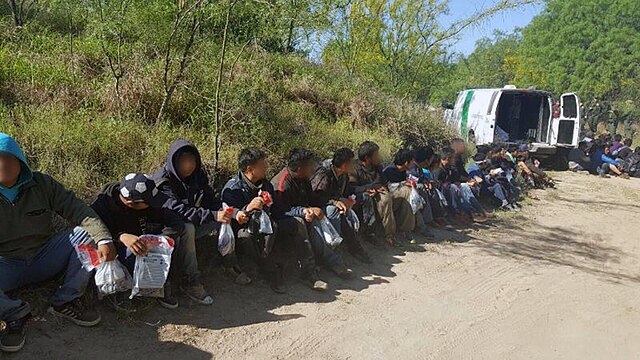Texas may have initiated a unique precedent recently.
Over the past three years, it has become nearly impossible to avoid the disturbing news unfolding on the U.S. southern border. Put mildly, it is a colossal disaster with limited solutions currently in sight. Rough estimates suggest that illegal crossings at the southern border have reached or exceeded 10 million in just a few brief years, marking the highest number in recorded American history. The identities of those crossing illegally and ultimately assimilating into U.S. society at the taxpayers' expense remain largely unknown.
Throughout this entire article, we will emphasize the operative word: illegal. Throughout this entire ordeal, we ought to emphasize the operative word: illegal. Illegal immigration.
Our very own elected system of government established laws that are not adhered to. In 1952, Congress enacted the Immigration and Nationality Act (INA) with the sole purpose of governing immigration law in the United States. How is that going? Since 2021, what is being enforced? What is being governed?
Others also equate the catastrophe to an actual land invasion — a blatant violation of Article IV, Section IV. We could go on about what laws are being violated and not being enforced, whether they are immigration laws, Article IV violations, etc. However, enforcement of any proactive measure is practically non-existent here. At best, the U.S. Border Patrol authority enforces a reactive measure, and they are underfunded, undermanned, and demoralized.
The U.S. is losing this battle.
In 2021, the State of Texas made an attempt to mitigate these federal illegalities with the establishment of Operation Lone Star. Govenor Greg Abbott directed the State's Department of Public Safety and the National Guard to install razor wire along the Rio Grande to help curb and hinder the number of illegal border crossings experienced in his state. To paraphrase Governor Abbott, "This is being done in the absence of the Federal Government." Operation Lone Star resulted in a series of jurisdictional disputes and lawsuits between the Biden Administration and Texas, and in December 2023, the entire case was elevated to the U.S. Supreme Court for review.
On Monday, January 22, 2024, The U.S. Supreme Court sided with the Biden Administration to the extent that the U.S. Border Patrol now has the authority to cut the razor wire installed by Texas while litigation continues. This would allow the Border Patrol to physically reach the illegal immigration offenders more easily in order to process them as seen fit. Safety for the illegals being injured by the wire was cited as one of the more pressing concerns in the Court's decision.
The jurisdictional debate here between a federal and state entity is a tit-for-tat across the board, depending on your current immigration policy stance. What cannot be denied, though, is, again, the existence of illegalities. Immigrants continue to enter our country. Illegally.
Many of us do not live in Texas or anywhere near the southern border. We see the problem on television or social media. But it affects all of us.
So, what can be done to tackle this in the future? Construction of a border wall? To some extent, sure. Maybe. But what would be different if an Article V convention of states were convened at this point?
What Texas has attempted to do, perceptively, from one angle at least, is simply aid the U.S. Border Patrol in assuaging these unprecedented immigration concerns. A state should have that right to some degree. After all, they have a responsibility to look after the safety of the citizens within their own state borders.
COS presents an avenue for proposing and ratifying new constitutional amendments, offering a fresh legislative channel to address specific national issues that individual states believe are inadequately addressed at the federal level. Undoubtedly, Texas and other states along the southern border aspire to have a more significant say in shaping the handling of immigration law violations within their borders. However, citizens in states not situated along the southern border are not immune to the cascading effects of the crisis. Unvetted individuals bring an unlimited account of dangerous uncertainties into our society as a whole. Examples include the influx of drug infestation, rampant crime, the increase in social welfare benefits distributed amongst unvetted individuals, questionable voter registration to non-citizens, etc.
It has been said, over and over, that we are a nation of laws. If the federal government is neither interested nor capable of enforcing these laws to protect the safety and sovereignty of its citizens, maybe the individual states deserve a shot in the form of an Article V convention, providing a broader attack on the problem.
Many political pundits opine that the immigration problem may be intentional. Well, if that is indeed the case, then a new set of effective checks and balances originating at or involving a convention certainly wouldn't hurt at this juncture. After all, the illegalities occurring at the U.S. southern border remain inadequately addressed by an ineffective Congress, a disengaged executive branch, and a bloated federal bureaucracy.
The answer may indeed be similar to what Texas is doing: Tackling the problem at the grassroots level. A very good start!


